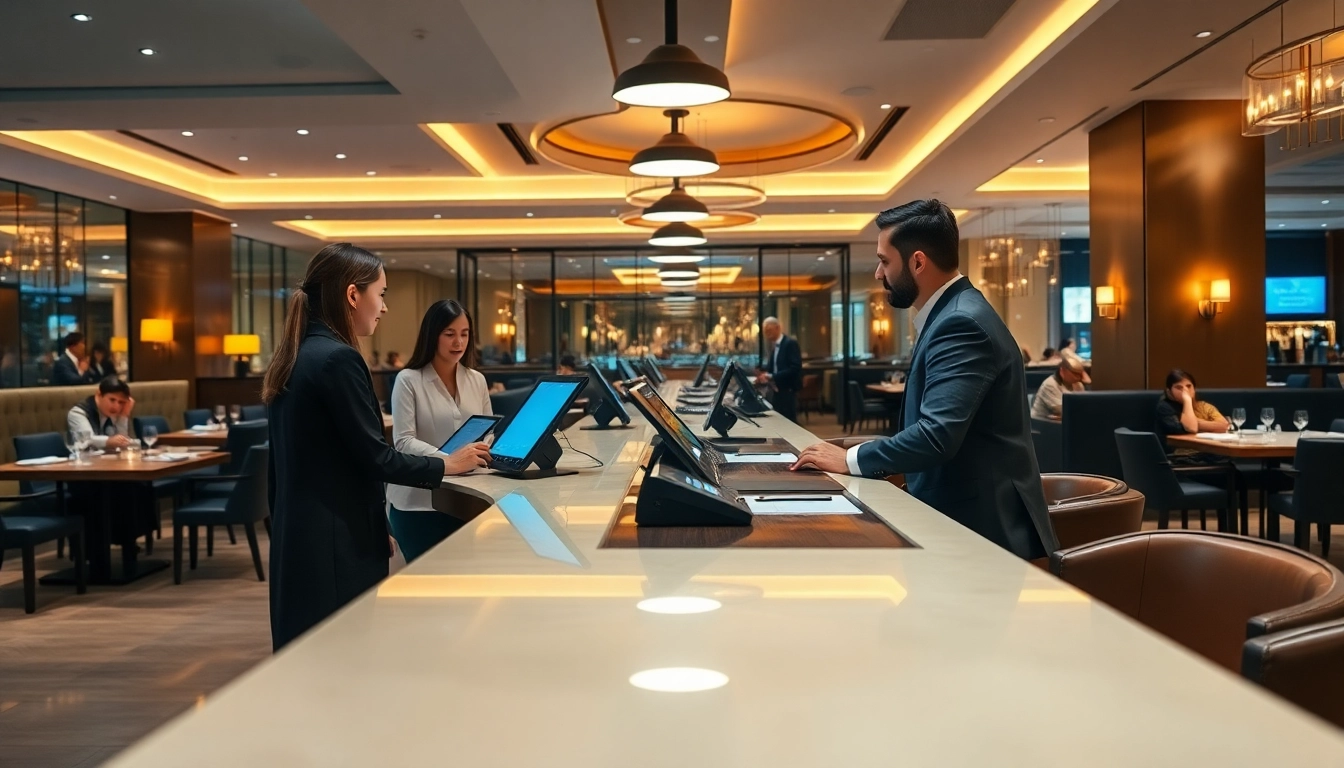Understanding Reservation Services
What Are Reservation Services?
Reservation services play a critical role in various industries, especially in hospitality, travel, and dining. They provide a systematic way to secure bookings for customers, ensuring that they can enjoy the services they desire without disruption. At their core, reservation services allow users to reserve a spot or service for a future date, which can include restaurant tables, hotel rooms, travel itineraries, and more. The advent of technology has vastly improved how these services are managed and executed, making the booking process more efficient for both businesses and consumers.
Key Features of Reservation Systems
Modern reservation systems come equipped with various features designed to enhance user experience and operational efficiency. Some of the key features include:
- Real-time Availability: Customers can view available time slots and make instant reservations, which eliminates the frustration of overbooking.
- Online Booking: Many systems offer online platforms that allow users to book reservations anytime, providing flexibility and convenience.
- Automated Reminders: These services often include automated notifications via email or text, reminding customers of their upcoming reservations.
- Customer Management: Reservation systems typically have integrated management tools to keep track of customers and their preferences, enhancing personalization.
- Payment Processing: Secure payment options can be integrated, allowing for easy deposit and full payment transactions directly through the reservation system.
- Analytics and Reporting: Businesses can gain insights into booking trends and customer preferences, helping them make data-driven decisions.
Benefits of Using Reservation Services
Utilizing reservation services offers numerous benefits to both businesses and consumers. Key advantages include:
- Enhanced Efficiency: Reservation systems streamline the booking process, reducing the need for manual entry and minimizing human error.
- Increased Revenue: By allowing for real-time bookings and optimizing table or room usage, businesses can maximize their occupancy rates, leading to higher revenues.
- Improved Customer Satisfaction: The convenience of being able to book and modify reservations enhances the overall customer experience, encouraging repeat business.
- Better Resource Management: Businesses can allocate resources more effectively when they have access to real-time data about their reservations and traffic.
- Brand Reputation Enhancement: A seamless booking experience can bolster a company’s reputation, leading to positive reviews and referrals.
Choosing the Right Reservation Service
Factors to Consider When Selecting a Service
Choosing the right reservation service is crucial for meeting the needs of your business and your customers. When evaluating options, consider the following:
- Usability: The interface should be user-friendly for both your staff and customers. A complicated reservation system can deter bookings.
- Integration Capabilities: Ensure that the service can integrate seamlessly with existing systems such as point of sale (POS) systems, customer relationship management (CRM) software, and marketing tools.
- Customization Options: The ability to customize the booking process and ensure it aligns with your brand is essential for providing a consistent customer experience.
- Pricing Structure: Understand the pricing model (subscription vs. per booking fees) and assess whether it aligns with your budget and expected return on investment.
- Customer Support: Good customer support is indispensable, especially during the initial setup and implementation phases. Assess the quality and availability of support offered by the provider.
Top Reservation Service Providers
The reservation service market features several prominent providers known for their reliable and innovative solutions. A few of the top players include:
- OpenTable: A leader in restaurant reservations, OpenTable offers a robust platform that includes features for managing customer relationships and analytics.
- Tock: Tock provides unique solutions not only for restaurant booking but also for experiences at bars and wineries, focusing on creating memorable events.
- Resy: Known for its high-end clientele, Resy uses advanced technology to improve the dining reservation experience and enhance brand engagement.
- Bookeo: A versatile service tailored for various businesses including tours and classes, Bookeo focuses on growth and adaptability.
- Yelp Reservations: Integrated with Yelp’s review platform, this service not only allows bookings but also helps businesses engage with customer reviews directly.
Comparing Features and Pricing
Comparison shopping is essential when selecting a reservation service. Each provider offers different features that may better suit various types of businesses. It’s crucial to analyze:
- Feature Set: Compare what each system offers—some might provide better customer management tools, while others may have superior payment processing options.
- Pricing Transparency: Look closely at the pricing structure to understand their long-term costs fully. Some platforms may seem affordable at first but can accumulate high costs with booking fees or hidden charges.
- Trial Periods: Utilize trial periods to test functionalities, which can be invaluable before committing to a long-term contract.
Best Practices for Implementing Reservation Services
Integrating with Existing Systems
Implementing a new reservation system can pose challenges, especially regarding integration with existing business operations. Best practices for successful integration include:
- Conducting Compatibility Assessments: Before selecting a new reservation system, assess how it can work with your current tools and software.
- Establishing Clear Goals: Define what you want to achieve with the new system—be it improved customer satisfaction, increased reservations, or streamlined operations.
- Testing Integration: Allow for a testing phase where you can identify any potential issues between the old and new systems before going live.
Training Staff for Effective Use
Ensuring that staff can effectively use the reservation system is key to maximizing its benefits. Training tips include:
- Hands-on Training Sessions: Organize training sessions that allow staff to interact with the system under real-time conditions.
- Creating User Manuals: Documentation outlining step-by-step instructions can aid in the transition and serve as a reference point.
- Encouraging Feedback: Create an open channel for staff to provide feedback or ask questions during the training to address concerns immediately.
Collecting and Analyzing Customer Feedback
Post-implementation, collecting feedback can help refine the reservation system to better serve your customers. Effective methods include:
- Follow-up Communications: Sending follow-up emails or surveys can yield insights into customer experiences and satisfaction levels.
- Monitoring Online Reviews: Keeping an eye on what customers say about their reservation experience can help identify trends that may require attention.
- Using Analytics Tools: Leverage built-in analytics from the reservation service to gain insights into customer behaviors and preferences.
Common Challenges in Reservation Management
Dealing with No-Shows and Cancellations
No-shows and cancellations can significantly impact revenue. To combat this, businesses can adopt various strategies:
- Cancellation Policies: Establish clear policies that outline penalties for cancellations or no-shows, incentivizing customers to adhere to their bookings.
- Automated Reminders: Utilize the reminder features of your reservation system to send confirmations and reminders to clients, reducing the chances of forgetfulness.
- Flexible Booking Options: Offer customers the possibility to modify rather than cancel their reservations to minimize lost opportunities.
Technical Issues and Troubleshooting
Technical issues can arise and affect reservation processes. Here are ways to manage these challenges:
- Routine Maintenance: Regularly scheduled checks and maintenance of your reservation system can prevent unexpected downtimes.
- Dedicated Support Teams: Partner with providers that offer dedicated technical support to address issues efficiently.
- Creating Backup Procedures: Implement backup systems for data to ensure continuity in operations during technical failures.
Maintaining a Personal Touch
As businesses increasingly rely on technology, maintaining a personal connection with customers is vital. Consider these tactics:
- Personalized Messaging: Use customer data to send personalized messages and offers, enhancing the booking experience.
- Custom Requests: Allow customers to include special requests during the reservation process, such as dietary restrictions or celebration mentions.
- Post-Visit Engagement: Engage customers after their visit with thank-you notes or satisfaction surveys to showcase that their experience matters.
Future Trends in Reservation Services
Embracing Technology in Reservation Management
The landscape of reservation services is evolving with technological advancements. New trends include:
- Artificial Intelligence: AI is increasingly being integrated into reservation systems to enhance customer interactions and improve service efficiency.
- Mobile Optimization: As mobile usage continues to rise, more businesses are optimizing their reservation services for mobile devices.
- Data Analytics: Enhanced data analytics tools are providing businesses with deeper insights into customer behaviors, enabling more targeted marketing and personalized experiences.
Personalization and Customer Experience Enhancements
Consumers expect personalized experiences now more than ever. Reservations services are adapting by:
- Tailoring Recommendations: With machine learning, reservation systems can offer tailored suggestions based on previous bookings and preferences.
- Customer Loyalty Programs: Integrating loyalty programs into reservation services to reward returning customers can enhance retention and boost satisfaction.
- Feedback Implementation: Actively analyzing customer feedback to refine the reservation process and offerings creates a more engaging experience for users.
Global Trends Affecting Local Dining Reservations
Global events, consumer preferences, and technological advancements are shaping local dining reservations. Key trends include:
- Health and Safety Awareness: Businesses are increasingly focused on transparency regarding health measures, influencing customer comfort levels during booking.
- Demand for Unique Experiences: There is a rising trend towards experiential dining, leading to more creative reservation strategies.
- Social Media Influence: Social platforms heavily influence consumer choices, with many customers booking directly from social media advertisements and promotions.



